 He makes Angolan music for 40 years, has nearly 500 musical themes recorded and “many miles on the road”. Bonga, whose voice identifies with Angola, has always been attentive to the reality of his country, preserving and disseminating the Semba musical style. He is keen to highlight: “Just like Brazil has Samba and America has Rock, Angola has Semba. It is the music I heard in the cradle”. His musical path was marked by his respect to “origin, tradition and pulse of the Semba”, taking it and spreading it around the world.
He makes Angolan music for 40 years, has nearly 500 musical themes recorded and “many miles on the road”. Bonga, whose voice identifies with Angola, has always been attentive to the reality of his country, preserving and disseminating the Semba musical style. He is keen to highlight: “Just like Brazil has Samba and America has Rock, Angola has Semba. It is the music I heard in the cradle”. His musical path was marked by his respect to “origin, tradition and pulse of the Semba”, taking it and spreading it around the world.
Stages
23.07.2012 | by Marta Lança
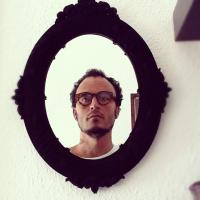 And he answers that the production company that he is part of, Generation 80, was born under a very good star: “there is a crisis in the world, money is for some people ever more difficult to get, but technology is also more at hand for everybody. There are advantages in these days of bureaucracies and problems getting a foot in the door – you don’t need an investment of millions to work in this field and to make a film with a camcorder.”
And he answers that the production company that he is part of, Generation 80, was born under a very good star: “there is a crisis in the world, money is for some people ever more difficult to get, but technology is also more at hand for everybody. There are advantages in these days of bureaucracies and problems getting a foot in the door – you don’t need an investment of millions to work in this field and to make a film with a camcorder.”
Face to face
23.07.2012 | by Marta Lança
 He paid a visit to studios in the musseques (local neighbourhoods), he had talks with producers to give support for his Akwaaba Music, a digital platform dedicated to African music and pop culture, providing visibility for quality people in music who don’t have the structure needed to go far in the business. In the last 3 years, Lebrave has produced works with more than 70 artists from 15 African countries and has been working on the development of a global network covering the production of contents, digital distribution, marketing and licensing.
He paid a visit to studios in the musseques (local neighbourhoods), he had talks with producers to give support for his Akwaaba Music, a digital platform dedicated to African music and pop culture, providing visibility for quality people in music who don’t have the structure needed to go far in the business. In the last 3 years, Lebrave has produced works with more than 70 artists from 15 African countries and has been working on the development of a global network covering the production of contents, digital distribution, marketing and licensing.
Face to face
23.07.2012 | by Marta Lança
 While some commentators and journalists have dismissed Occupy Wall Street as carnival, lawmakers and police officers did not miss the point. They reached back to a mid-nineteenth century ban on masking to arrest occupiers wearing as little as a folded bandana on the forehead, leaving little doubt about their fear of Carnival as a potent form of political protest. New York Times journalist Ginia Bellafante initially expressed skepticism about 'air[ing] societal grievance as carnival,' but just a few days later she warned against 'criminalizing costume,' thus changing her condescension to caution as she confirmed the police’s point: masking can be dangerous, Carnival is serious business.
While some commentators and journalists have dismissed Occupy Wall Street as carnival, lawmakers and police officers did not miss the point. They reached back to a mid-nineteenth century ban on masking to arrest occupiers wearing as little as a folded bandana on the forehead, leaving little doubt about their fear of Carnival as a potent form of political protest. New York Times journalist Ginia Bellafante initially expressed skepticism about 'air[ing] societal grievance as carnival,' but just a few days later she warned against 'criminalizing costume,' thus changing her condescension to caution as she confirmed the police’s point: masking can be dangerous, Carnival is serious business.
Stages
21.07.2012 | by Claire Tancons
 I hate world music. That's probably one of the perverse reasons I have been asked to write about it. The term is a catchall that commonly refers to non-Western music of any and all sorts, popular music, traditional music and even classical music. It's a marketing as well as a pseudomusical term — and a name for a bin in the record store signifying stuff that doesn't belong anywhere else in the store.
I hate world music. That's probably one of the perverse reasons I have been asked to write about it. The term is a catchall that commonly refers to non-Western music of any and all sorts, popular music, traditional music and even classical music. It's a marketing as well as a pseudomusical term — and a name for a bin in the record store signifying stuff that doesn't belong anywhere else in the store.
Mukanda
20.07.2012 | by David Byrne
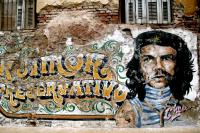 It’s Friday afternoon at the Al-Ahmad mosque in lower Buenos Aires. Despite gathering here with their multicultural brethren for prayer service, the small group of African men walking out the door is part of an inchoate community that has become a bit of a talking point in this vast and diverse metropolis.
It’s Friday afternoon at the Al-Ahmad mosque in lower Buenos Aires. Despite gathering here with their multicultural brethren for prayer service, the small group of African men walking out the door is part of an inchoate community that has become a bit of a talking point in this vast and diverse metropolis.
To read
08.06.2012 | by Pedro José-Marcellino aka P.J. Marcellino
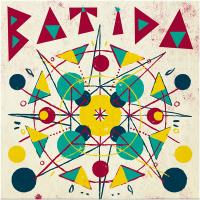 We are at the Batida workshop. A space in a garages complex in Lisbon. On the outside it’s just that. A building with nothing that distinguishes it from the others. Inside there is Pedro Coquenão, or DJ Mpula, or the man who invented Batida. Inside there, this 37-year-old Portuguese man born in Huambo (Angola), which he left with the onset of civil war, an Angolan living in Portugal since then, talks non-stop about all that Batida means. We could even say that we do not need to hear everything he is saying. The speakers release South African music. Scattered throughout the space we see a marimba, extemporary drums took out from diesel cans, Angolan beer “Cuca” bars, photos of Coquenão’s travels to Luanda, and drums that, in concert, will be illuminated from the inside as efficient do-it-yourself scenery. All this is Batida.
We are at the Batida workshop. A space in a garages complex in Lisbon. On the outside it’s just that. A building with nothing that distinguishes it from the others. Inside there is Pedro Coquenão, or DJ Mpula, or the man who invented Batida. Inside there, this 37-year-old Portuguese man born in Huambo (Angola), which he left with the onset of civil war, an Angolan living in Portugal since then, talks non-stop about all that Batida means. We could even say that we do not need to hear everything he is saying. The speakers release South African music. Scattered throughout the space we see a marimba, extemporary drums took out from diesel cans, Angolan beer “Cuca” bars, photos of Coquenão’s travels to Luanda, and drums that, in concert, will be illuminated from the inside as efficient do-it-yourself scenery. All this is Batida.
Stages
04.06.2012 | by
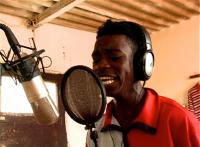 This article explores the role of Kuduro, the popular Angolan electronic music and dance style in the process of updating the national Angolan identity called angolanidade to the conditions of the new millennium.
This article explores the role of Kuduro, the popular Angolan electronic music and dance style in the process of updating the national Angolan identity called angolanidade to the conditions of the new millennium.
Stages
27.05.2012 | by Nadine Siegert and Stefanie Alisch
 All over Africa there is a certain revival of an industry of culture and memory, or perhaps even the cult of memory. And perhaps that's good news.
All over Africa there is a certain revival of an industry of culture and memory, or perhaps even the cult of memory. And perhaps that's good news.
Afroscreen
15.05.2012 | by Pedro José-Marcellino aka P.J. Marcellino
 You will find here the account of a series of journeys which I began in August 2010. You will also find in the text and drawings of Right After the Comma other earlier and later journeys which are not restricted by it and which will orbit and “de-temporalise” its central course.
You will find here the account of a series of journeys which I began in August 2010. You will also find in the text and drawings of Right After the Comma other earlier and later journeys which are not restricted by it and which will orbit and “de-temporalise” its central course.
To read
07.05.2012 | by Mattia Denisse
 Yonamine is very spontaneous in his work: he thinks about pictures or objects, old photographs, cigarettes packs, or curious textures, then follows their trail to create, to subvert certain applications and to give them other semiotic readings, by reinventing the fragments of different memories in a register of composed intelligibility. Conflict and unpredictability abound in his work and it’s this not classifiable side that troubles, in a good way, who watches it. You can immediately feel the urgency, and this may come largely from living in Angola.
Yonamine is very spontaneous in his work: he thinks about pictures or objects, old photographs, cigarettes packs, or curious textures, then follows their trail to create, to subvert certain applications and to give them other semiotic readings, by reinventing the fragments of different memories in a register of composed intelligibility. Conflict and unpredictability abound in his work and it’s this not classifiable side that troubles, in a good way, who watches it. You can immediately feel the urgency, and this may come largely from living in Angola.
Face to face
14.04.2012 | by Marta Lança
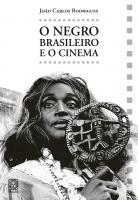 A frequent charge made about Brazilian cinema by Black intellectuals and artists is that the films do not present truly individualized characters, but rather mere archetypes and/or caricatures. The accusation is pertinent, since Brazilian cinema generally favors character-types, schematic or symbolic, Black or not.
In Black folklore in Brazil (1935), anthropologist Artur Ramos observed that orishas (African deities) “passed into Brazilian folklore and maintain close contact with the popular imagination, a magical and somewhat familiar contact, since they survive as symbols of individual complexes”. They appear as much in ancestral African religions (Candomblé), as in the Brazilian religion Umbanda, which absorbed other influences (e.g., indigenous, oriental).
A frequent charge made about Brazilian cinema by Black intellectuals and artists is that the films do not present truly individualized characters, but rather mere archetypes and/or caricatures. The accusation is pertinent, since Brazilian cinema generally favors character-types, schematic or symbolic, Black or not.
In Black folklore in Brazil (1935), anthropologist Artur Ramos observed that orishas (African deities) “passed into Brazilian folklore and maintain close contact with the popular imagination, a magical and somewhat familiar contact, since they survive as symbols of individual complexes”. They appear as much in ancestral African religions (Candomblé), as in the Brazilian religion Umbanda, which absorbed other influences (e.g., indigenous, oriental).
Afroscreen
24.03.2012 | by João Carlos Rodrigues
 South Africa´s theatre gains international recognition for its performance arts productions due to applying diverse aesthetics and the search of new stage approaches by many different artists. In addition, regularly scheduled national and international dance, performance art and theater festivals are organized like Invecting the City in Cape Town, Dance Umbrella in Johannesburg, and National Arts Festival in Grahams Town etc.
South Africa´s theatre gains international recognition for its performance arts productions due to applying diverse aesthetics and the search of new stage approaches by many different artists. In addition, regularly scheduled national and international dance, performance art and theater festivals are organized like Invecting the City in Cape Town, Dance Umbrella in Johannesburg, and National Arts Festival in Grahams Town etc.
Stages
07.03.2012 | by Grit Köppen
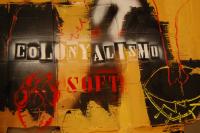 he ROOTS project approaches the slavery theme through/from a contemporary vision inspired by an archeological discovery in 2008 in the “green circle” in Lagos at the location which was known as the “Vale da Gafaria” (Valley of the Leper Hospital). In the area rescue archeological excavations that preceded the construction of one of the city’s underground car parks enabled the methodological investigation of the whole area affected by the enterprise - one of the ex-libris of urban regeneration that the municipal administration was able to carry out in the decade of the XXI Century.
he ROOTS project approaches the slavery theme through/from a contemporary vision inspired by an archeological discovery in 2008 in the “green circle” in Lagos at the location which was known as the “Vale da Gafaria” (Valley of the Leper Hospital). In the area rescue archeological excavations that preceded the construction of one of the city’s underground car parks enabled the methodological investigation of the whole area affected by the enterprise - one of the ex-libris of urban regeneration that the municipal administration was able to carry out in the decade of the XXI Century.
I'll visit
15.02.2012 | by Rui Parreira
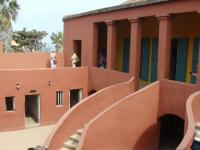 We land in Dakar at 2.30 in the morning. Looking from the plane at the Cap Vert peninsula, the map I had been studying for months now gains life. I know exactly where our hotel is. I come out of the plane looking for the first elemet that will prove I am in Africa. Nothing special, apart from the airport name: Léopold Sedar Senghor, Senegal´s first president, the president-poet.
We land in Dakar at 2.30 in the morning. Looking from the plane at the Cap Vert peninsula, the map I had been studying for months now gains life. I know exactly where our hotel is. I come out of the plane looking for the first elemet that will prove I am in Africa. Nothing special, apart from the airport name: Léopold Sedar Senghor, Senegal´s first president, the president-poet.
I'll visit
01.02.2012 | by Maria Vlachou
 The most interesting things happen often completely unexpected. On a trip to Nairobi, being busy with the Solo and Duo Festival of Dance Forum Nairobi I came along the dynamics of inspiring artists in the GoDown Art Centre located in the industrial area of town. There I had the coincidental chance to meet the dancer Irene Karanja in a daily rehearsal program for a dance show choreographed by Fernando Anuang´a. Her artist name is short: Renée.
The most interesting things happen often completely unexpected. On a trip to Nairobi, being busy with the Solo and Duo Festival of Dance Forum Nairobi I came along the dynamics of inspiring artists in the GoDown Art Centre located in the industrial area of town. There I had the coincidental chance to meet the dancer Irene Karanja in a daily rehearsal program for a dance show choreographed by Fernando Anuang´a. Her artist name is short: Renée.
Stages
28.12.2011 | by Grit Köppen
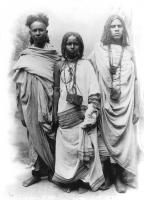 Nomads can be understood in different contexts, as in an anthropological sense, nomads as a new concept in philosophy and nomads as a real and metaphorical concept for new artistic praxis both in real and metaphorical senses. The real sense refers to art among nomadic people, while the metaphorical usage pertains to the use of nomadism in new artistic and theatrical creations.
Nomads can be understood in different contexts, as in an anthropological sense, nomads as a new concept in philosophy and nomads as a real and metaphorical concept for new artistic praxis both in real and metaphorical senses. The real sense refers to art among nomadic people, while the metaphorical usage pertains to the use of nomadism in new artistic and theatrical creations.
To read
20.12.2011 | by Knut OveArntzen
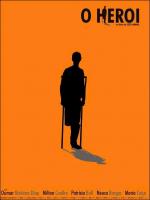 This article uses a reading of Zézé Gamboa's award-winning 2004 feature as a basis for an exploration of post-conflict Angolan screen culture and of its impact both at home and internationally. It considers how O Herói‟s depiction of a war-torn nation, and of the impediments to its reconstruction, negotiates between a socially-engaged film-making practice, informed by local tradition and the tenets of „Third Cinema‟, and the demands of a globalised cinema market. The film achieves this compromise by deploying allegorical and symbolic tropes, familiar from the literature, cinema, and political discourse of the era of Angolan liberation (notably, the concept of a socialist „new man‟), to complicate a superficially optimistic story of post-conflict rehabilitation, and to insinuate a critique of the authoritarian practices and neo-liberal policies of the MPLA government.
This article uses a reading of Zézé Gamboa's award-winning 2004 feature as a basis for an exploration of post-conflict Angolan screen culture and of its impact both at home and internationally. It considers how O Herói‟s depiction of a war-torn nation, and of the impediments to its reconstruction, negotiates between a socially-engaged film-making practice, informed by local tradition and the tenets of „Third Cinema‟, and the demands of a globalised cinema market. The film achieves this compromise by deploying allegorical and symbolic tropes, familiar from the literature, cinema, and political discourse of the era of Angolan liberation (notably, the concept of a socialist „new man‟), to complicate a superficially optimistic story of post-conflict rehabilitation, and to insinuate a critique of the authoritarian practices and neo-liberal policies of the MPLA government.
Afroscreen
19.12.2011 | by Mark Sabine
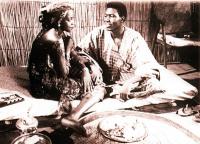 The variety of techniques and approaches to film in use in the present day impedes overarching judgments. Women’s increasing esteem and importance within the world of cinema has led to a diversity of intentions and perspectives; moreover, the character of global culture is such that the lines separating Africa from the West are no longer so clear as before.
The variety of techniques and approaches to film in use in the present day impedes overarching judgments. Women’s increasing esteem and importance within the world of cinema has led to a diversity of intentions and perspectives; moreover, the character of global culture is such that the lines separating Africa from the West are no longer so clear as before.
Afroscreen
06.12.2011 | by Beatriz Leal Riesco
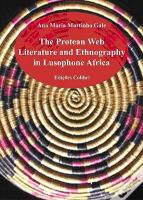 This book discusses colonial and postcolonial textuality under the theoretical scope of Literary Theory, Cultural Critique and Anthropology.
It focuses mostly but not exclusively on Angola and Moçambique. In these countries, Ethnographic Fiction has emerged as a genre that inspired until this day "violent readings" of history and society.
This book discusses colonial and postcolonial textuality under the theoretical scope of Literary Theory, Cultural Critique and Anthropology.
It focuses mostly but not exclusively on Angola and Moçambique. In these countries, Ethnographic Fiction has emerged as a genre that inspired until this day "violent readings" of history and society.
Mukanda
29.11.2011 | by Ana Maria Mão-de-Ferro Martinho